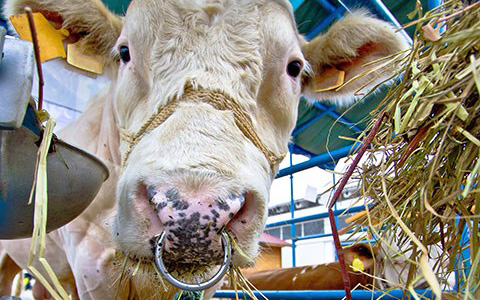Background
Project: QUANTOMICS
Europe is home to a high proportion of the world’s leading animal breeding organisations. Research being carried out by an EU-funded QUANTOMICS project is helping these breeders to remain competitive in global markets.

‘Improvement of animals through selective breeding is a continuous process that delivers permanent and cumulative improvements in livestock performance,’ explains Chris Warkup, director of the Biosciences Knowledge Transfer Network (KTN), a project partner.
‘For example,’ he says, ‘today we get about twice as much lean meat from a tonne of pig feed as we did in the 1960s. These improvements in biological efficiency also translate to reduced environmental footprint per unit of food produced. In the last 20 years the Global Warming Potential per egg or per kilo of chicken has been reduced by over 20 percent – more than 1 percent each year in a process that continues.
The Biosciences KTN, part of the University of Edinburgh’s Roslin Institute, is coordinating the QUANTOMICS project, ‘From Sequence to Consequence – Tools for the exploitation of livestock genomes’. This EUR 8.14 million project involves 17 leading research groups and businesses and is co-financed by the European Commission’s Seventh Framework Programme. Its aim has been to deliver a step-change in the availability of cutting-edge technologies and tools for the economic exploitation of livestock genomes.
Historically, livestock breeding was relatively simple as it focused on easily-measured traits such as the milk yield of cows or growth rate of pigs and chickens. These days, it is much more complex as breeders take account of much more balanced and sustainable breeding objectives that include health and welfare traits. Some of these traits are difficult or impossible to measure in a young animal, when selection decisions have to be made, and it is for these traits that molecular genetic tools of the kind developed by QUANTOMICS are most valuable.
‘The unusual thing about the QUANTOMICS consortium is that it is not comprised of all the usual suspects,’ Mr Warkup says. ‘We deliberately recruited the best European groups in particular aspects of human or animal genomics, even if they had not previously worked on livestock genomics. It has been a genuine pleasure working with such a great group of scientists.
And the results have been impressive. QUANTOMICS has delivered new basic biological information on the genomes of cattle and chickens including whole-genome sequencing of almost 20 bulls.
Particularly interesting information on repeated sections of the genome, called Copy Number Variants, has been generated, but Mr Warkup says, ‘We have yet to determine how relevant these are to variation in health and productivity traits of livestock.
The project has also delivered new bioinformatics analysis and visualisation tools, as well as new molecular genetics and quantitative analysis tools that are being used already by livestock breeders.
The project has applied these new tools to important disease traits in dairy cattle and broiler chickens. The results are still being analysed and validated, according to the team.
QUANTOMICS partners believe the real long-term benefit to EU citizens will be improvements in the economic, environmental and societal sustainability of meat, milk and eggs. By applying knowledge of DNA sequencing to improve breeding, the project is also contributing to better animal welfare and safer, higher-quality food from more sustainable European farms.
This innovation was made possible by Israel’s continued participation in the official Horizon 2020 fund, managed in Israel by ISERD part of The Israel Innovation Authority (Formerly the Office of the Chief Scientist and MATIMOP). The initiative has taken Israeli R&D to the next level with the help of ground-breaking collaboration between scientists in Israel and Europe, as well as essential funding and support.
Project details
Project acronym: QUANTOMICS
Participants: UK (Coordinator), Denmark, Norway, Germany, Spain, Italy, Finland, Israel, Greece, Australia
Proj. N° 222664
Total costs: € 8 145 356,9
EU contribution: € 5 999 671
Duration: June 2009 – November 2013
